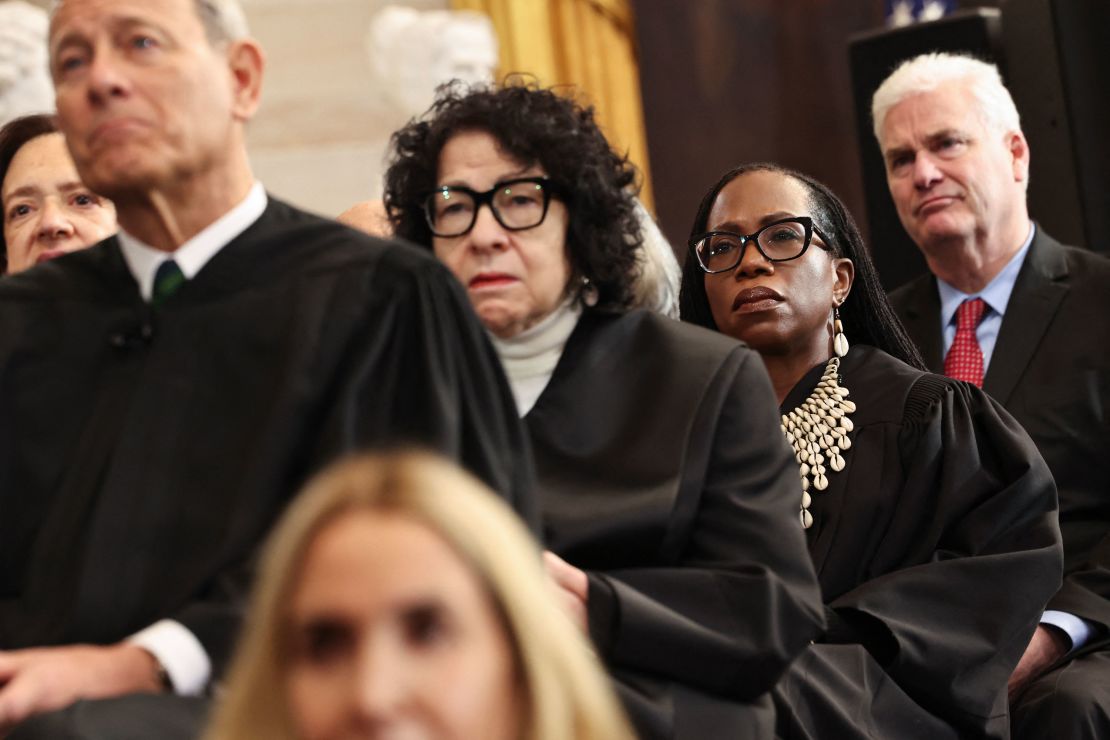CNN
—
President Donald Trump unquestionably secured a big win as the conservative Supreme Court wrapped up its term this past week, but there were signs that the administration’s long-running feud with the federal judiciary is far from over.
Immigrant rights groups raced into lower courts hours after the justices handed down their final decisions, seeking to block Trump’s executive order ending birthright citizenship through class-action lawsuits. The outcome of those cases will almost certainly wind up back before the Supreme Court in short order.
Uncertainty is also swirling around the court’s other blockbuster 6-3 decision, handed down a week earlier, that upheld Tennessee’s ban on gender-affirming care for transgender minors. While the ruling will protect similar gender-affirming care bans in other conservative states, it did little to address other transgender legal disputes involving sports teams and health insurance coverage.
“In the high-profile cases, you see the court departing from settled precedent, changing the rules of the road, but ultimately leaving a lot open to be decided in the future,” Cecillia Wang, national legal director at the American Civil Liberties Union, told CNN. “It leaves us room to fight another day.”
In all, the Supreme Court issued 62 opinions over the course of its nine-month term that began in October, including many that have already faded from memory. Just before Trump was inaugurated in January, the court upheld a controversial ban on TikTok that the president has since bypassed. And in March, a majority upheld Biden-era federal regulations on “ghost guns,” mail-order kits that allow people to build untraceable weapons at home.
Here are some of the major themes from the Supreme Court’s term.
Since he returned to power in January, Trump and his allies have waged a rhetorical war on the federal judiciary. But in recent weeks, the Supreme Court has repeatedly given the White House reason to celebrate.
The birthright citizenship decision was the most notable example, but the court has also sided with the White House in a series of less high-profile emergency docket cases as well. Earlier in the week, the Supreme Court granted Trump’s emergency request to resume deporting migrants to countries other than their homeland, including places like war-torn South Sudan.
Trump has secured clear victories in eight of the last 10 emergency cases the court has decided, including decisions that allowed him to end humanitarian parole for certain migrants, to grant the Department of Government Efficiency access to sensitive Social Security data, and to bar transgender Americans from serving in the military.
At times, the Supreme Court’s language has looked strikingly similar to the points Trump and his allies have been making for months.
“No one disputes that the executive has a duty to follow the law. But the judiciary does not have unbridled authority to enforce this obligation,” Justice Amy Coney Barrett wrote in the court’s birthright opinion. “When a court concludes that the executive branch has acted unlawfully, the answer is not for the court to exceed its power, too.”
While the Supreme Court’s term is over, the controversies the justices grappled with for weeks will likely be back — soon.
As the justices rose from their mahogany bench Friday for their summer recess, it was increasingly clear that the rulings in their two most important cases — on transgender care and birthright citizenship — are likely returning to them in short order.
The fallout from the conservative court’s 6-3 decision to uphold Tennessee’s ban on gender-affirming care for minors will land as soon as Monday, when the justices will decide how to deal with half a dozen other cases involving transgender issues pending on the docket, including appeals involving trans athletes.
The birthright citizenship decision gave Trump’s opponents a wide berth to maneuver their way back to the Supreme Court in the coming weeks.
That fight got underway just hours after the Supreme Court handed down its blockbuster opinion Friday curbing the use of nationwide court orders to block Trump’s agenda. The ACLU and others raced into lower courts with new litigation that will almost certainly shut down Trump’s ability to enforce birthright citizenship again — rulings that, no matter how they turn out, will quickly be appealed.
“Justice Barrett’s opinion doesn’t actually prevent lower courts from quickly putting nationwide blocks on the birthright citizenship executive order back into place,” said Steve Vladeck, CNN Supreme Court analyst and professor at Georgetown University Law Center.
If lower courts side with the pregnant mothers in a class-action case or with 22 blue states that also sued over the executive order, that would have the effect of pausing Trump’s executive order while courts consider its constitutionality.
“It’s not hard to imagine, if that happens, that the Trump administration will come right back to the court, which will then have to settle what it quite deliberately ducked on Friday,” Vladeck said.
Just over 9% of the court’s decisions this term were split along ideological lines, compared with 14% over the past four terms, according to data compiled by SCOTUSblog. About 4 in 10 decisions were unanimous, the data showed, which is consistent with past terms.
“There’s a lot of litigation still to come on these,” said Carrie Severino, president of the Judicial Crisis Network and a former clerk to conservative Justice Clarence Thomas.
“But that is, in fact, why we consider those the big cases, because they’re going to have a lot of downstream effects,” she added. “There’s always a period of the lower courts working out how to apply them.”
Justice Ketanji Brown Jackson is the most junior member of the Supreme Court, but after three years on the bench, she is making sure her voice is heard.
A series of scathing dissents penned by Jackson have, in recent days, drawn nearly as much attention as the court’s majority opinions.

Barrett’s majority opinion in the birthright case spent a considerable amount of ink pushing back on Jackson’s dissent, which she registered with “deep disillusionment.” The junior justice described the majority’s opinion as an “existential threat to the rule of law” and a “smokescreen.”
“Perhaps the degradation of our rule-of-law regime would happen anyway,” Jackson wrote in her dissent. “But this court’s complicity in the creation of a culture of disdain for lower courts, their rulings, and the law (as they interpret it) will surely hasten the downfall of our governing institutions, enabling our collective demise.”
Days earlier, dissenting from a decision that sided with fuel producers, Jackson wrote that court’s opinion left the impression that “moneyed interests enjoy an easier road to relief in this Court than ordinary citizens.”
And in a case dealing with whether Planned Parenthood and one of its patients could sue South Carolina over the state’s decision to pull the organization’s Medicaid funding, Jackson entered into a sharp exchange with Thomas over the meaning of a Reconstruction-era law that allows people to sue the government in federal court for potential violations of their civil rights.
Jackson said that the majority, which barred Planned Parenthood’s suit, was weakening “the landmark civil rights protections that Congress enacted during the Reconstruction Era” and said the court’s ruling “is likely to result in tangible harm to real people.”
“At a minimum, it will deprive Medicaid recipients in South Carolina of their only meaningful way of enforcing a right that Congress has expressly granted to them,” she wrote. “And, more concretely, it will strip those South Carolinians — and countless other Medicaid recipients around the country — of a deeply personal freedom: the ‘ability to decide who treats us at our most vulnerable.’”
The Supreme Court has in recent terms sought to roll back the power of federal agencies to make decisions without approval from Congress. That was particularly evident last term, when the court struck down the so-called Chevron doctrine, a 1984 precedent that required judges to defer to an agency’s interpretation of a statute in circumstances in which the law in question is vaguely written. But this term, the court rebuffed efforts by conservative groups to keep that momentum going.
In some of those disputes, the Trump officials embraced positions originally taken by former President Joe Biden, even though the two administrations are diametrically opposed on many policies. And that put the Trump administration, at times, in the awkward position of defending a policy that Biden had backed but that was being challenged by conservative groups at the Supreme Court.
In one of those cases, decided Friday, a 6-3 majority upheld a task force that recommends preventive health care services that insurers must cover at no cost under Obamacare. The Trump administration defended the task force over a challenge from a Texas company, Braidwood Management. The company was represented by Jonathan Mitchell, a veteran conservative lawyer who successfully defended Trump last year from an effort in Colorado to remove him from that state’s primary ballot.
The court also let stand a series of decades-old government programs that reduce the price of broadband internet and telephone services for poor and rural communities. The Federal Communications Commission pays for those programs with fees applied to Americans’ phone bills.
Groups had used the case to try to revive a New Deal-era legal doctrine that bars Congress from delegating its authority to federal agencies — a doctrine the court has not relied on since the 1930s. In an opinion joined by both conservative and liberal justices, the court signaled it was unlikely to do so again anytime soon.
“For nearly three decades, the work of Congress and the Commission in establishing universal service programs has led to a more fully connected country,” liberal Justice Elena Kagan wrote for a 6-3 court. “It has done so while leaving fully intact the separation of powers integral to our Constitution.”

